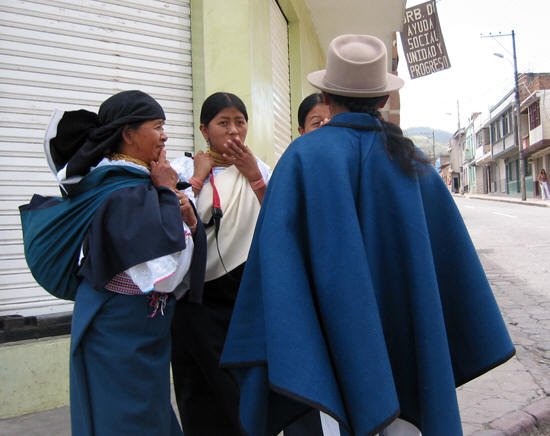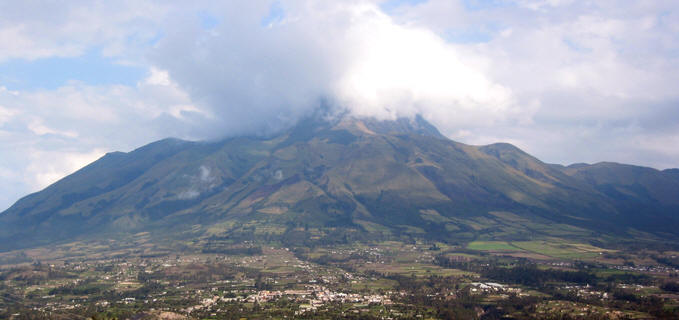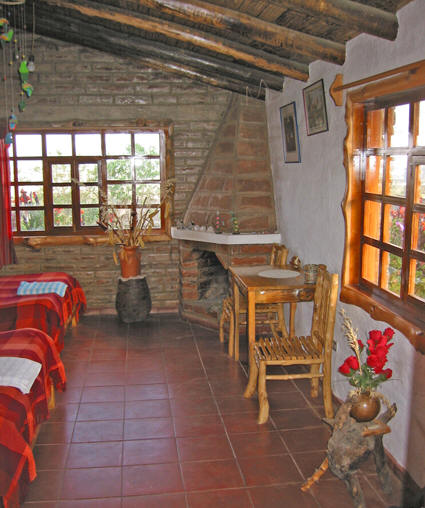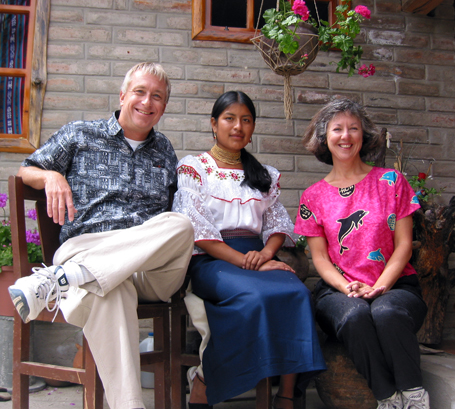|
In 1991 Billy and Akaisha Kaderli retired at the age
of 38. Now, into their 4th decade of this
financially independent lifestyle, they invite you
to take advantage of their wisdom and experience. |
|
QUECHUA CONNECTION
TUNIBAMBA, ECUADOR
Billy and Akaisha Kaderli
We see them everywhere. In Otavalo, the Indigenous
people walk the streets selling their wares, and fill the internet cafés. But
how do they really live? On our recent trip to Otavalo, Ecuador, we
arranged to spend a night with a Quechua family in their home nestled high in the
Andes.
Native Travel specializes in
cultural tourism and arranged this stay for us to experience life in a
Quechua village. At $20 per night per person, we could hardly refuse.

JUST A CORNER CONVERSATION
Assurances were made
that there was running water and electric for our
comforts. Breakfast and dinner would be prepared for us and was included
in the price. We had little to worry about and the opportunity
offered us much to see and share.
On
our drive up to the lodge with Geert at the wheel, and Sabundo, a guide,
sitting with me in the back seat, we met up with an anciana carrying 40
kilos of potatoes on her back. Geert offers her a ride up the hill, and
she is thrilled. Sebundo jumps out, grabs her huge woven plastic
sack, takes the woven band off her head, and heaves the potatoes
into the back seat. I don’t know how old this anciana is, but she nimbly and
gratefully jumps into the back seat of the truck and we ride up the
hill. The wind blows her head shawl around, but she is
smiling as she sees her laborious trek up the hill considerably
shortened by this free ride. Disembarking, and loading up again with the
sack of potatoes, she most thankfully speaks and waves her hands to us
and barefoot, heads back up the hill.

RIGHT IN THE VILLAGE, THE FRONT OF OUR LODGE
Mama and daughter greeted us with genuine warmth.
This was in fact their home, and we were their guests.
When we actually saw the room we would occupy, we were most impressed.
Along with a private bath, we had a view of
Vulcan Imbabura that would knock your socks off. Out the other window
was a clear open shot of a road winding through the village of Tunibamba.
From either window you could see villagers going about their normal
daily lives.
Only 30 minutes outside of Otavalo, we were up in the Andes with
stunning views, quiet and tranquility. No taxis or vendors here.
Geert, the owner of Native Travel, began this tourism adventure a
couple of years or so
ago. Working with indigenous families like Digna and Juan, who are willing to have people
live in their homes, Native Travel offers half the price of building the lodge, and the natives work out paying for the other
50%. Built of
locally made bricks, tile, and labor, the family has a vested interest in
making this project work. Because of the
stability of Geert and his business, the family becomes a good candidate for a loan from the town’s bank. Your $20 per person
staying at the lodge benefits both the family as well as Geert’s eco travel tourism business.
It is a good arrangement, and is a low impact tourist stay.

VIEW FROM OUR WINDOW!
On the average, it affords the native family an increase of about $100 a
month, which typically doubles a decent wage in Ecuador. This allows for
more comfort, although at present, does not pay for higher education for Digna and Juan's daughters. They have hope that this will come in the future.
One can tell that the house and surrounding areas are kept with care.
The gardens surrounding this lodge are nicely done with beautiful
flowers in the front of the house, and a vegetable and fruit tree garden
in the back. the garden helps to feed both the family and the guests.
The rest of the food, Digna gets in town.

OUR SPACIOUS ROOM WITH DESK AND FIREPLACE
The accommodations are upscale, and very much worth the price asked
to stay. In our room there were two full size beds and a private bath,
with hot water, and two windows each looking out to a different angle of
the neighboring activities. The surrounding scenery is awesome. Need we say again, that we are in
the midst of the Andes Mountains in South America?
Juan made most of this lodge himself, since he is a fine bricklayer.
The family has been most polite, and willing to share their stories, and
tales of the Incas, in their best Spanish, as we don’t
speak Quechua, their native language.
The peace and quiet here is very notable. At times, I felt we were
shouting while in normal conversation It was not necessary to
speak so loud, when there was no din to overcome. One can hear
church bells or some other kind of bell ringing on occasion, perhaps to
signal the time or the upcoming mass. Andean music wafted through
the windows throughout the day, and Hummingbirds of brilliant iridescent
green flit around to get their nectar.

CRISTINA MAKING POTATO TORTILLAS
The family seemed a bit mystified and pleased that we thought what
they were doing was worthy of our taking photos. We were concerned
that they thought we might be disrespectful, but they were most
accommodating.
Dinner was chicken, a salad of radishes and potato tortillas: mashed potato with
seasoning and cheese then pan fried. Juice of tree tomatoes was a
delight, and dessert of a local fruit that looked like a very long acorn
squash, peeled and cooked with clove and sugar, like a compote.
Just excellent. All of this while
conversing with Juan and wife, Digna, as they too dined with us.
We made much conversation during dinner
preparation, and at dinner itself, with the help of a dictionary. At one
point, I told Digna and Juan that it took special people to open their
home to strangers, but they did not know the word for stranger, in
Spanish. I find it in the dictionary, and it gives a second word, which
they still did not know. Digna goes to get her glasses to read, but the
word still does not make a recognition… I wonder if they even use that
word?

DELICIOUS BEYOND DESCRIPTION
However, then we get to conversing about the glasses
she pulled out protectively from a tiny case. A guest who had stayed
here in their home noticed that Digna could not see very well (she is
50) and so returned with a small pair of reading glasses, the Dean Adele
type from a drug store. I asked if many people in the community need
glasses, and the response was a resounding YES!
Everyone is up early this morning, Juan has left,
Nancy was washing clothes at dawn, and the water irrigates the garden,
and Digna is sweeping the front walkway. There is also a cobblestone
walkway leading from the back of the house out to the side wooden gate.
Very carefully made.

A FINE BREAKFAST IN THE MORNING
For breakfast this morning we had tortilla de los huevos, or an
omelet with cheese and garlic, freshly squeezed orange juice that was so
sweet, a local herb that tasted similar to lemon grass for tea, local
fresh cheese, buns made from wheat flour and marmelada de moro, or
blackberry marmalade, seeded. The marmalade was still warm! Digna kept
us company at breakfast time, and I asked about her family. Her mother
is still living, but her father died decades ago. She has one sister,
who is ill, and it is very sad. This sister lives with her mother.
Digna pretty much runs the lodge herself, with her daughters helping to
make the meals, and do laundry. She goes to town to buy what she needs
for the meals, she tends the garden, and she keeps us all company for
the meals she serves. She was mentioning that it is better when there
are guests, as she feels much more alone during the day, when her
husband is gone 5 days a week, and her children are in school. This
gives her a communication outlet and she very much enjoys that.
I mentioned to her that I don’t want to bother her with too many
questions, or photos, but she said she enjoyed that. “Es bonito”, she
says…
Digna took me around her large garden and explained each plant. She
had several kinds of peppers, some hotter than others, broccoli, brussel
sprouts, lettuce, cabbage, corn, melons, fruits having no English name,
morning glories, herbs for medicinal teas, aloe vera (which she said
when a child is ill, one mixes the center of the aloe plant with fruit
or fruit juice, and it heals the child at the same time it tastes good.)
She had guinea pigs in cages ready for eating (cuy), a local specialty,
and several chickens with eggs in their nests.

DIGNA, OUR HOSTESS
I noticed that she had nasturtium growing in several places, and I
brought up to her that in my country, we eat this flower and leaves in a
salad. She was quite surprised, had never heard of such a thing, and so
I took a small and a large leaf, and a decent flower, and we split them
and ate them. She liked them! I told her to mix in with a little salad
dressing, and wait 5 minutes and then serve. She could eat them alone or
along with lettuce… she was so surprised and very grateful!
When we were getting ready to leave, Nancy was ironing sheets to dry
them, as they needed to be changed for the newcomers for the night, and
Digna was making bread. In this huge pot (50 gallon pot?) she put wheat
flour, eggs and water, who knows what else, I did not see yeast..
Although she did taste the water, and I wondered about that. She may
have had yeast in that water, but it was not foaming. Anyway, she said
she would be making about 50 loaves or bread pieces with this bread
dough.

NANCY SITS IN THE MIDDLE
She cut the dough into several large loaves to knead on her wooden
table, which she scrubbed earlier.




Retire
Early Lifestyle appeals to a different
kind of person – the person who prizes their
independence, values their
time, and who doesn’t want to mindlessly
follow the crowd.
HOME
Book Store
Retire Early Lifestyle Blog
About Billy & Akaisha
Kaderli
Press
Contact
20 Questions
Preferred
Links
Retirement
Country Info
Retiree Interviews
Commentary
REL Videos
|